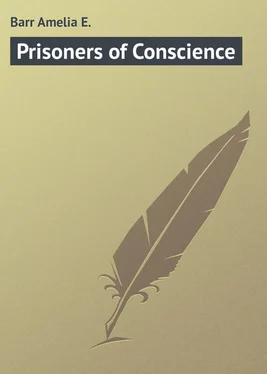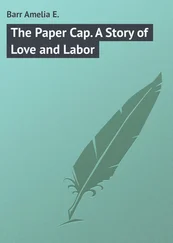Amelia Barr - Prisoners of Conscience
Здесь есть возможность читать онлайн «Amelia Barr - Prisoners of Conscience» — ознакомительный отрывок электронной книги совершенно бесплатно, а после прочтения отрывка купить полную версию. В некоторых случаях можно слушать аудио, скачать через торрент в формате fb2 и присутствует краткое содержание. Жанр: foreign_prose, на английском языке. Описание произведения, (предисловие) а так же отзывы посетителей доступны на портале библиотеки ЛибКат.
- Название:Prisoners of Conscience
- Автор:
- Жанр:
- Год:неизвестен
- ISBN:нет данных
- Рейтинг книги:5 / 5. Голосов: 1
-
Избранное:Добавить в избранное
- Отзывы:
-
Ваша оценка:
- 100
- 1
- 2
- 3
- 4
- 5
Prisoners of Conscience: краткое содержание, описание и аннотация
Предлагаем к чтению аннотацию, описание, краткое содержание или предисловие (зависит от того, что написал сам автор книги «Prisoners of Conscience»). Если вы не нашли необходимую информацию о книге — напишите в комментариях, мы постараемся отыскать её.
Prisoners of Conscience — читать онлайн ознакомительный отрывок
Ниже представлен текст книги, разбитый по страницам. Система сохранения места последней прочитанной страницы, позволяет с удобством читать онлайн бесплатно книгу «Prisoners of Conscience», без необходимости каждый раз заново искать на чём Вы остановились. Поставьте закладку, и сможете в любой момент перейти на страницу, на которой закончили чтение.
Интервал:
Закладка:
He began his devotions in the spirit of Christ, but they ended always in a passionate arraignment of Bele Trenby through the psalms of David. These wondrously human measures got Liot’s heart in their grip; he wept them and prayed them and lived them until their words blended with all his thoughts and speech; through them he grew “familiar” with God, as Job and David and Jonah were familiar–a reverent familiarity. Liot ventured to tell Him all that he had to suffer from Bele–the lies that he could not refute, the insolences he could not return, his restricted intercourse with Karen, and the loss of that frank fellowship with such of his townsmen as had business reasons for not quarreling with Bele.
So matters went on, and the feeling grew no better, but worse, between the men. When the devil could not find a man to irritate Bele and Liot, then he found Matilda Sabiston always ready to speak for him. She twitted Bele with his prudences, and if she met Liot on the street she complimented him on his patience, and prophesied for Karen a “lowly mannered husband, whom she could put under her feet.”
One day in October affairs all round were at their utmost strain. The summer was over, and Bele was not likely to make the Shetland coast often till after March. His talk was of the French and Dutch ports and their many attractions. And Matilda was cross at the prospect of losing her favorite’s society, and unjustly inclined to blame Bele for his want of success with her niece.
“Talk if you want to, Bele,” she said snappishly, “of the pretty women in France and Holland. You are, after all, a great dreamer, and you don’t dream true; the fisherman Liot can win where you lose.”
Then Bele said some words about Liot, and Matilda laughed. Bele thought the laugh full of scorn; so he got up and left the house in a passion, and Matilda immediately turned on Karen.
“Ill luck came with you, girl,” she cried, “and I wish that Christmas was here and that you were out of my house.”
“No need to wait till Christmas, aunt; I will go away now and never come back.”
“I shall be glad of that.”
“Paul Borson will give me shelter until I move into my own house.”
“Then we shall be far apart. I shall not be sorry, for our chimneys may smoke the better for it.”
“That is an unkind thing to say.”
“It is as you take it.”
“I wonder what people will think of you, aunt?”
“I wonder that, too–but I care nothing.”
“I see that talk will come to little, and that we had better part.”
“If you will marry Bele we need not part; then I will be good to you.”
“I will not marry Bele–no, not for the round world.”
“Then, what I have to say is this, and I say it out: go to the Borsons as soon as you can; there is doubtless soul-kin between you and them, and I want no Borson near me, in the body or out of the body.”
So that afternoon Karen went to live with Paul Borson, and there was great talk about it. No sooner had Liot put his foot ashore than he heard the story, and at once he set it bitterly down against Bele; for his sake Karen had been driven from her home. There were those that said it was Bele’s plan, since she would not marry him, to separate her from her aunt; he was at least determined not to lose what money and property Matilda Sabiston had to leave. These accusations were not without effect. Liot believed his rival capable of any meanness. But it was not the question of money that at this hour angered him; it was Karen’s tears; it was Karen’s sense of shame in being sent from the home of her only relative, and the certain knowledge that the story would be in every one’s mouth. These things roused in Liot’s soul hatred implacable and unmerciful and thirsty for the stream of life.
Yet he kept himself well in hand, saying little to Karen but those things usually whispered to beloved women who are weeping, and at the end of them this entreaty:
“Listen, dear heart of mine! I will see the minister, and he will call our names in the kirk next Sunday, and the next day we shall be married, and then there will be an end to this trouble. I say nothing of Matilda Sabiston, but Bele Trenby stirs up bickerings all day long; he is a low, quarrelsome fellow, a very son of Satan, walking about the world tempting good men to sin.”
And Karen answered: “Life is full of waesomeness. I have always heard that when the heart learns to love it learns to sorrow; yet for all this, and more too, I will be your wife, Liot, on the day you wish, for then if sorrow comes we two together can well bear it.”
II
JEALOUSY CRUEL AS THE GRAVE
After this event all Lerwick knew that Karen Sabiston was to be married to Liot Borson in less than three weeks. For the minister was unwilling to shorten the usual time for the kirk calling, and Karen, on reflection, had also come to the conclusion that it was best not to hurry too much. “Everything ought to bide its time, Liot,” she said, “and the minister wishes the three askings to be honored; also, as the days go by, my aunt may think better and do better than she is now minded to.”
“If I had my way, Karen–”
“But just now, Liot, it is my way.”
“Yours and the minister’s.”
“Then it is like to be good.”
“Well, let it stand at three weeks; but I wish that the time had not been put off; ill luck comes to a changed wedding-day.”
“Why do you forespeak misfortune, Liot? It is a bad thing to do. Far better if you went to the house-builder and told him to hire more help and get the roof-tree on; then we need not ask shelter either from kin or kind.”
It was a prudent thought, and Liot acknowledged its wisdom and said he would “there and then go about it.” The day was nearly spent, but the moon was at its full, and the way across the moor was as well known to him as the space of his own boat. He kissed Karen fondly, and promised to return in two or three hours at the most; and she watched his tall form swing into the shadows and become part and parcel of the gray indistinctness which shut in the horizon.
There was really no road to the little hamlet where the builder lived. The people used the sea road, and thought it good enough; but the rising moon showed a foot-path, like a pale, narrow ribbon, winding through the peat-cuttings and skirting the still, black moss waters. But in this locality Liot had cut many a load of peat, and he knew the bottomless streams of the heath as well as he knew the “races” of the coast; so he strode rapidly forward on his pleasant errand.
The builder, who was also a fisherman, had just come from the sea; and as he ate his evening meal he talked with Liot about the new house, and promised him to get help enough to finish it within a month. This business occupied about an hour, and as soon as it was over Liot lit his pipe and took the way homeward. He had scarcely left the sea-shore when he saw a man before him, walking very slowly and irresolutely; and Liot said to himself, “He steps like one who is not sure of his way.” With the thought he called out, “ Take care! ” and hastened forward; and the man stood still and waited for him.
In a few minutes Liot also wished to stand still; for the moon came from behind a cloud and showed him plainly that the wayfarer was Bele Trenby. The recognition was mutual, but for once Bele was disposed to be conciliating. He was afraid to turn back and equally afraid to go forward; twice already the moonlight had deceived him, and he had nearly stepped into the water; so he thought it worth his while to say:
“Good evening, Liot; I am glad you came this road; it is a bad one–a devilish bad one! I wish I had taken a boat. I shall miss the tide, and I was looking to sail with it. It is an hour since I passed Skegg’s Point–a full hour, for it has been a step at a time. Now you will let me step after you; I see you know the way.”
Читать дальшеИнтервал:
Закладка:
Похожие книги на «Prisoners of Conscience»
Представляем Вашему вниманию похожие книги на «Prisoners of Conscience» списком для выбора. Мы отобрали схожую по названию и смыслу литературу в надежде предоставить читателям больше вариантов отыскать новые, интересные, ещё непрочитанные произведения.
Обсуждение, отзывы о книге «Prisoners of Conscience» и просто собственные мнения читателей. Оставьте ваши комментарии, напишите, что Вы думаете о произведении, его смысле или главных героях. Укажите что конкретно понравилось, а что нет, и почему Вы так считаете.












